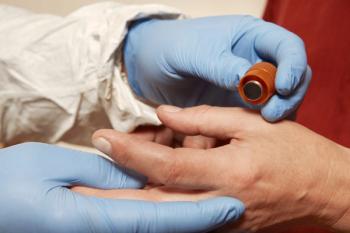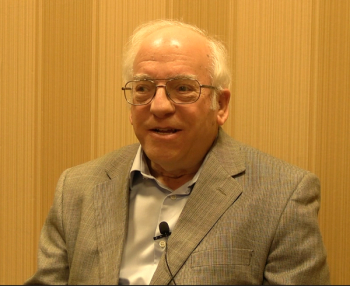
- October 2023
- Volume 38
- Issue 10
- Pages: 20–21
Overcoming the Matrix Effect in the Elemental Analysis of Steel: An Interview with 2023 Meggers Award Winner Johannes Pedarnig
A recent investigation of the optical emission of plasma on industrial steel samples using LA-SD-OES and LIBS revealed new findings about the oxide composition of the slag layer.
The William F. Meggers Award was established in 1970 to honor its namesake, referred to by the National Institute of Standards and Technology on their website as “Dean of American Spectroscopists,” for his notable contributions to that field. This year’s recipient, Johannes Pedarnig of the Institute of Applied Physics at Johannes Kepler University (Linz, Austria) has recently investigated the optical emission of plasma on industrial steel samples utilizing laser ablation-spark discharge-optical emission spectroscopy (LA-SD-OES) and laser-induced breakdown spectroscopy (LIBS). Pedarnig spoke to Spectroscopy about this work as well as what winning the Meggers Award means to him.
In a recent paper (1), you discuss utilizing laser ablation-spark discharge-optical emission spectroscopy (LA-SD-OES) and laser-induced breakdown spectroscopy (LIBS) to overcome the matrix effect in the elemental analysis of steel. Why is the elemental analysis of steel important and what are the advantages of these specific analytical techniques?
Steel is a high-tech material with one of the largest volumes of production of all technical materials. Almost 2000 million tons of crude steel have been produced worldwide in 2021. The development of new (and optimized) grades of steel is a continuously ongoing process. Today, more than 3500 different grades are available. The steel grades have very different materials properties depending on the chemical composition and the production processes. Typically, more than 90 weight% of steel is made up by iron, up to 2 wt% is carbon, and the rest is covered by many other chemical elements. As the steel properties are critically depending on composition, the chemical element analysis of the produced material is crucial to ensure the targeted steel materials specifications are met.
The main advantage of laser-induced breakdown spectroscopy (LIBS) for the analysis of steel is the versatility of this technique. LIBS can be deployed in the field under harsh conditions and fast measurements can be performed that are otherwise not possible. One example is LIBS measurements of steel inline of the production process, which has been reported by several groups. This is useful to analyze and check the composition of the liquid steel and of the slag layer before the material is casted and further processed. The versatility of LIBS comes (often) at the cost of lower element sensitivity and laboratory-based techniques may have orders of magnitude lower (better) limits of detection than LIBS. A further disadvantage of LIBS (and of many other analytical techniques) is the potential matrix effect. The signal measured for a specific chemical element is not only depending on the concentration of the analyte, but also on the other elements in the material. The new LA-SD-OES technique combines LIBS with a second step for plasma excitation and this has enabled us to reduce the detrimental matrix effect in the element analysis of steel.
What made you decide to use these specific techniques to achieve accurate and rapid analysis of steel?
Laser-based spectroscopy techniques have a unique selling point when it comes to the analysis of steel in production, as no other technique is available to measure inline the chemical composition of liquid steel (temperature around 1500 °C). We have performed several research projects and inline measurement campaigns together with our industrial partner, voestalpine Stahl.
What are some of the limitations with current techniques being used to perform steel analysis?
The major limitation with standard techniques such as spark optical emission spectroscopy (OES) and X-ray fluorescence (XRF) spectroscopy is the offline measurement. Steel samples have to be taken, cooled down, sent to a laboratory, and measured. All this is slowing down the production process and the time required for element analysis may prevent from adjustment of the composition of the liquid steel.
Please summarize your findings in your research and describe what was most surprising or exciting about it.
We found that the slag layer, which is formed in steel production, and which is covering the steel liquid, can be chemically analyzed by a “calibration-free (CF)” LIBS method. We can determine the concentration of the major oxides in slag down to a concentration of about 1 wt% without measuring any reference material for calibration of the LIBS device. It was exciting for us to see that a physical model can be used to evaluate the optical emission spectra of laser-induced plasma and to determine the complex oxide composition of slags via this so-called CF-LIBS model.
Were there any specific unexpected limitations or challenges you encountered in your work?
Yes, there were several unexpected challenges. For instance, the temperature in the steel plant may vary from below 0 °C to above 30 °C. A high-resolution spectrometer, even if it is “temperature stabilized”, may not cope with large temperature variations and the measured spectra may be useless if this parameter is not precisely controlled.
Can you please summarize the feedback that you have received from others regarding your efforts?
Our papers on LIBS and LA-SD-OES are frequently cited, and we are invited to conferences; we are taking this as stimulating feedback from our colleagues worldwide.
What are the next steps in this research?
One of our next steps is the diversification to measure other materials as well. In a preliminary study we found that LA-SD-OES performs well for the analysis of technical polymers, significantly better than LIBS does. And of course, we will go one with the spectroscopy and chemical element analysis of steel and other metals.
What does your being named the recipient of the Meggers Award mean to you professionally? Personally?
Well, receiving this prestigious Meggers Award is a great honor for my research group and for me personally. It shows us that our research work is anticipated and appreciated. Furthermore, I am expecting this Award to boost our co-operation with industries and to support the raising of research funds.
Reference
(1) Grünberger, G.; Ehrentraut, V.; Eschlböck-Fuchs, S.; Hofstadler, J.; Pissenberger, A.; Pedarnig, J. D. Overcoming the Matrix Effect in the Element Analysis of Steel: Laser Ablation-Spark Discharge-Optical Emission Spectroscopy (LA-SD-OES) and Laser-Induced Breakdown Spectroscopy (LIBS). Anal. Chim. Acta 2023, 1251, 341005. DOI:
About the Interviewee
Articles in this issue
Newsletter
Get essential updates on the latest spectroscopy technologies, regulatory standards, and best practices—subscribe today to Spectroscopy.




